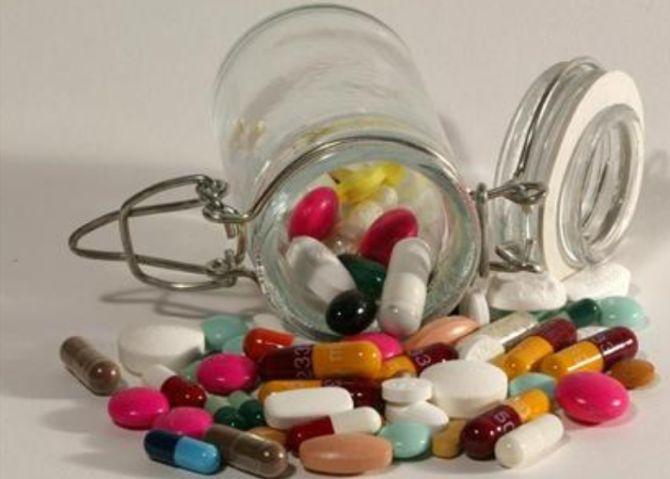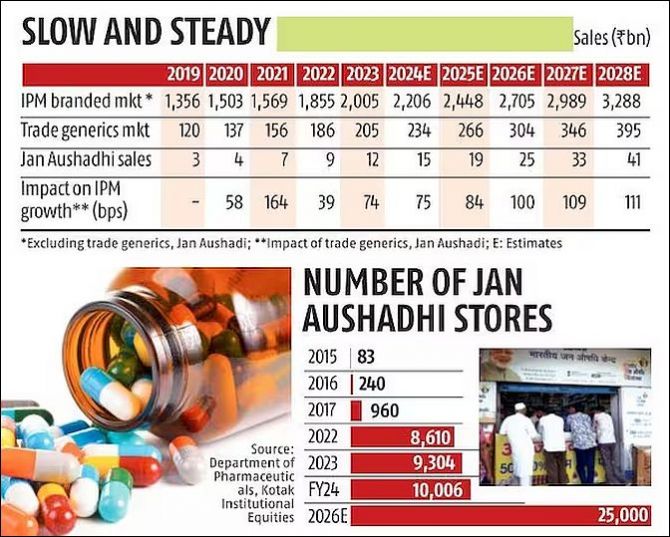Rising penetration of trade generic medicines is eating into the value growth of the domestic pharmaceutical market, showed a recent analysis.

According to a Kotak Institutional Equities analysis, 70-110 basis points (bps) annual dent is expected from trade generics and Jan Aushadhi on Indian Pharma Market (IPM) growth at least until FY27-28 (see chart).
Trade generic medicines are those that are not pushed into the market through doctor promotions.
Rather, pharma companies supply these medicines directly to the distributors.
Typically, trade generic medicines are available at a 50-60 per cent discount to branded generic medicines as there is no marketing expense incurred.
The Centre is targeting to increase the Jan Aushadhi store count by 2.5 times to 25,000 in less than two and half years (end of FY26).
As of November 2023, there are 10,006 Jan Aushadhi stores opened across 753 districts in the country.
Around 33 per cent of the stores are now in South India, with a high skew towards Karnataka and Kerala.

As such, UP has the highest number of Jan Aushadhi stores (1,481).
Kotak Institutional Equities noted in a December report that the government is targeting Rs 1,400-crore sales for the Pradhan Mantri Bharatiya Janaushadhi Pariyojana (PMBJP) in FY24.
Jan Aushadhi now has a 4-4.5 per cent share of the total volume in the domestic market, and revenues per store have improved post the pandemic, suggesting an increasing traction.
Currently, the product basket of PMBJP includes more than 1,965 drugs and 293 medical consumables and equipment.
More than 1 million people visit Jan Aushadhi stores daily.
The government has set up a network of four warehouses at Gurugram, Bengaluru, Guwahati and Surat, along with 36 distributors across the country.
Krishnanath Munde, associate director at India Ratings, told Business Standard that trade generics is the fastest growing with more than 25 per cent compound annual growth rate (CAGR) in the IPM over the last 10 years (around 15 per cent of IPM size).
This is against an IPM growth of 11-13 per cent over the same period.
Recently, big pharma firms have warmed up to the potential of this segment to drive volume growth.
Kotak analysts noted that apart from Cipla (Rs 2,000 crore annual trade generics sales) and Alkem (Rs 1,300 sales), historically, pharma companies have been rather non-committal about expanding presence in the Rs 20,500-crore trade generics market.
However, owing to a continued gradual volume shift towards generics, pharma firms have been increasingly focusing on the trade generics segment.
In the recent past, companies such as Mankind, Torrent Pharma and Dr Reddy s (DRL) have started their trade generics divisions, they said.
Currently, Jan Aushadhi and trade generics combined constitute around 20-22 per cent of the total drug volumes in India.
Factoring in the impact of lower prices in both the trade generics and Jan Aushadhi (unbranded generics) channels, we estimate a 70-110 bps annual dent from trade generics and Jan Aushadhi on the branded segment s (IPM) growth at least until FY28E, the report added.
Munde said big Indian pharma firms are entering this space because of multiple factors.
They have the highest return on capital employed (RoCE) with no major investment required, robust growth of this segment and penetration in Tier II and beyond.
Another factor is the mid-teen earnings before interest, taxes, depreciation, and amortisation (Ebitda) margin (lower than branded generic but incremental) with no incremental marketing/employee or R&D spend.
Pharma companies are trying to cash in on the growing demand for quality medicines in this segment, MV Ramana, chief executive officer (CEO), branded markets (India and emerging markets), DRL, said during the first quarter earnings call.
We were representing around 50-52 per cent of the market through our portfolio, and now we have entered the trade generics segment.
We will know about the traction in the coming few quarters, Ramana had said.
A senior analyst with a market research agency said that companies don't sell drugs through the trade generics route in therapy areas where they already have a strong presence or market share.
But this route becomes an easy way to expand presence in markets where they do not have a strong presence through their salesforce, the person added.
Players like Cipla feel that the India and Bharat story is incomplete without this segment.
Umang Vohra, managing director (MD) and global chief executive officer (global CEO), Cipla, one of the largest players in the trade generics space with reach in over 15,000 pincodes, said during the company' s first quarter earnings call, "My sense is that the trade generics market is around 25 per cent of the IPM by value.
"By volume, it would be around 40-45 per cent or so.
"This market is growing at 14 per cent or so.
Now 60 per cent of India is able to access and afford medicines.
Therefore, adequate emphasis needs to be given on this segment, he added.
Almost 80 per cent of the trade generics market is in Tier-2 to Tier-6 cities.











